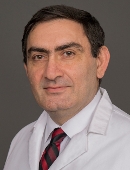Biography
Research Topics
Aging, Angiogenesis, Anti-Tumor Therapy, Antibody Development, Atherosclerosis, Cancer, Cardiovascular, Chemokines, Cytokines, DNA Repair, Endothelial Cells, Epigenetics, Epigenomics, Fibrosis, Gene Regulation, Genetics, Genomics, Growth Factors and Receptors, Inflammation, Molecular Biology, Receptors, Regeneration, Space Flight, Technology & Innovation, Translational Research, Tumor Suppressor Genes, Tumorigenesis
Aging, Angiogenesis, Anti-Tumor Therapy, Antibody Development, Atherosclerosis, Cancer, Cardiovascular, Chemokines, Cytokines, DNA Repair, Endothelial Cells, Epigenetics, Epigenomics, Fibrosis, Gene Regulation, Genetics, Genomics, Growth Factors and Receptors, Inflammation, Molecular Biology, Receptors, Regeneration, Space Flight, Technology & Innovation, Translational Research, Tumor Suppressor Genes, Tumorigenesis
